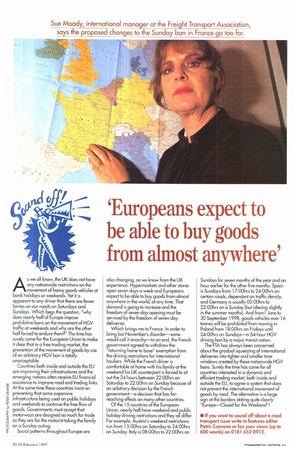'Europeans expect to be able to buy goods from almost anywhere'
Page 65

If you've noticed an error in this article please click here to report it so we can fix it.
As we all know, the UK does not have any nationwide restrictions on the movement of heavy goods vehicles at bank holidays or weekends. Yet it is apparent to any driver that there are fewer lorries on our roads on Saturdays and Sundays. Which begs the question, "why does nearly half of Europe impose prohibitive bans on the movement of HGV traffic at weekends and why are the other half forced to endure them?" The time has surely come for the European Union to make it clear that in a Free trading market, the prevention of the movement of goods by use of an arbitrary HGV ban is totally unacceptable.
Countries both inside and outside the EU are improving their infrastructures and the emerging nations often receive EU financial assistance to improve road and trading links. At the same time these countries insist on preventing that same expensive infrastructure being used on public holidays and weekends to continue the free flow of goods. Governments must accept that motorways are designed as much for trade as they are for the motorist taking the family on a Sunday outing. Social patterns throughout Europe are also changing, as we know from the UK experience. Hypermarkets and other stores open seven days a week and Europeans expect to be able to buy goods from almost anywhere in the world, at anytime. That demand is going to increase and the freedom of seven-day opening must be serviced by the freedom of seven-day deliveries.
Which brings me to France. In order to bring last November's disorder—some would call it anarchy—to an end, the French government agreed to withdraw the "returning home to base" exemption from the driving restrictions for international hauliers. While the French driver is comfortable at home with his family at the weekend his UK counterpart is forced to sit out the 24 hours between 22:00h rs on Saturday to 22:00hrs on Sunday because of an arbitrary decision by the French government—a decision that has farreaching effects on many other countries. Of the 15 countries of the European Union, nearly half have weekend and public holiday driving restrictions and they all differ. For example, Austria's weekend restrictions run from 15:00hrs on Saturday to 24:00hrs on Sunday. Italy is 08:00hrs to 22:00hrs on Sundays for seven months of the year and an hour earlier for the other five months. Spain is Sundays from 17:00hrs to 24:00hrs on certain roads, dependent on traffic density, and Germany is usually 00:00hrs to 22:00hrs on a Sunday (but altering slightly in the summer months). And froml June to 30 September 1998, goods vehicles over 16 tonnes will be prohibited from moving in Poland from 18:00hrs on Fridays until 24:00hrs on Sundays—a 54-hour HGV driving ban by a major transit nation. The FTA has always been concerned about the gradual squeezing of international deliveries into tighter and smaller time windows created by these nationwide HGV bans. Surely the time has come for all countries interested in a dynamic and efficient trading market, both inside and outside the EU, to agree a system that does not prevent the international movement of goods by road. The alternative is a large sign at the borders stating quite clearly "Europe—Closed for the Weekend"!
• If you want to sound off about a road transport issue write to features editor Patric Cunnane or fax your views (up to 600 words) on 0181 652 8912.


























































































































